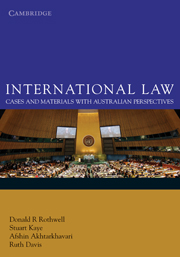Book contents
- Frontmatter
- Contents
- Preface
- About the authors
- Acknowledgements
- Table of cases
- Table of statutes
- Table of treaties and other international instruments
- Abbreviations
- 1 The nature of international law
- 2 Sources of international law
- 3 Law of treaties
- 4 International and municipal law
- 5 International legal personality
- 6 Sovereignty over territory
- 7 Jurisdiction
- 8 State responsibility
- 9 Human rights
- 10 Law of the sea
- 11 International environmental law
- 12 Enforcement of international law
- 13 The peaceful settlement of international disputes
- Index
- References
3 - Law of treaties
- Frontmatter
- Contents
- Preface
- About the authors
- Acknowledgements
- Table of cases
- Table of statutes
- Table of treaties and other international instruments
- Abbreviations
- 1 The nature of international law
- 2 Sources of international law
- 3 Law of treaties
- 4 International and municipal law
- 5 International legal personality
- 6 Sovereignty over territory
- 7 Jurisdiction
- 8 State responsibility
- 9 Human rights
- 10 Law of the sea
- 11 International environmental law
- 12 Enforcement of international law
- 13 The peaceful settlement of international disputes
- Index
- References
Summary
Introduction
The rapid development of international law in the post–World War II period from 1945 onwards also coincided with greater reliance upon treaties as a source of international law. Treaties had always been recognised as a source of international law, and their status was confirmed in art 38 of the Statute of the International Court of Justice (ICJ Statute). However, it was the development of the United Nations (UN), with its emphasis upon international law and focus upon treaty-making as a means of not only peaceful resolution of disputes but also multilateral agreement between States on matters of common concern, that was the catalyst for a greater reliance upon treaties in the conduct of international relations.
The UN actively promoted reliance upon treaties as a means of developing international law, with the International Law Commission (ILC) tasked in its early years with the responsibility of drafting a number of treaties which were then presented for negotiation and consideration at a multilateral conference of UN member States. Through this process, international law rapidly developed in the postwar period of the late 1940s to 1960s in areas such as international humanitarian law, the law of the sea, and human rights. While these developments were occurring at the multilateral level under either the sponsorship of the UN or other developing international organisations, there was also a growth in bilateral treaty-making as States began developing their postwar economies and rebuilding their international relations across many different fields of interest.
- Type
- Chapter
- Information
- International LawCases and Materials with Australian Perspectives, pp. 102 - 158Publisher: Cambridge University PressPrint publication year: 2010

